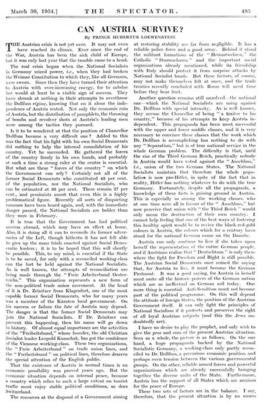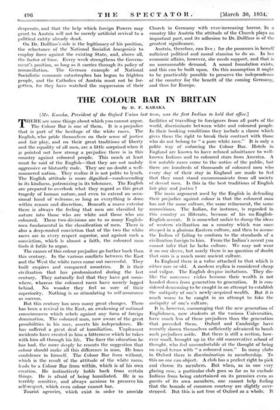CAN AUSTRIA SURVIVE ?
By PRINCE HUBERTUS LOEWENSTEIN
THE Austrian crisis is not yet over. It may not even have reached its climax. Ever since the end of the War, Austria has been the sick child of Europe, but it was only last year that the trouble came to a head.
The real crisis began when the National Socialists in Germany seized power, i.e., when they had broken the Weimar Constitution to which they, like all Germans, were sworn. Since then they have turned their attention to Austria with ever-increasing energy, for to subdue her would at least be a visible sign of success. They have shrunk at nothing in their attempts to overthrow the Dollfuss regime, knowing that on it alone the inde- pendence of Austria rested. Not only the economic ruin of Austria, but the distribution of pamphlets, the throwing of bombs and revolver shots at Austria's leading men were among the tactics they pursued.
Is it to be wondered at that the position of Chancellor Dollfuss became a very difficult one ? Added to this was the fact that his fight with his own Social Democrats did nothing to help the internal consolidation of his country. Yet he succeeded. He gathered the forces of the country firmly in his own hands, and probably at such a time a strong ruler at the centre is essential. But what are these " forces of the country " on which the Government can rely? Certainly not all of the former Social Democrats who constituted 48 per cent. of the population, nor the National Socialists, who can be estimated at 30 per cent. There remain 27 per cent., and pessimists assert that even this is a highly problematical figure. Recently all sorts of disquieting rumours have been heard again, and, with the immediate danger passed, the National Socialists are bolder than they were in February.
It is true that the Government has had political success abroad, which may have an effect at home. Also, it is doing all it can to reconcile its former adver- saries of the Left, though hitherto it has not felt able to give up the mass trials enacted against Social Demo- cratic leaders ; it is to be hoped that this will shortly be possible. This, to my mind, is essential if the State is to be saved, for only with a reconciled working-class can the fort be held against the National Socialists. As is well known, the attempts of reconciliation are being made through the " Freie Arbeiterbund Oester- reichs." This organization represents a new form of the non-political trade union movement. At the head of it is Dr. Zeinitzer from Klagenfurt, one of the most capable former Social Democrats, who for many years was a member of the Karnten local government. On his success or failure the fate of Austria may depend. The danger is that the former Social Democrats may join the National Socia lists. If Dr. Zeinitzer can prevent this happening, then his name will go down to history. Of almost equal importance are the activities of the "Freiheitsbund," whose founder, the old Christian Socialist leader Leopold Kunschak, has got the confidence of the Viennese working-class. These two organizations, the " Freie Arbeiterbund " on trade union lines, and the " Freiheitsbund " on political lines, therefore deserve the special attention of the English public.
That the existence of Austria in normal times is an economic possibility was proved years ago. But the economic situation depends on internal peace, because a country which relies to such a large extent on tourist traffic must enjoy stable political conditions, as does Switzerland.
The resources at the disposal of a Government aiming at restoring stability are far from negligible. It has a reliable police force and a good army. Behind it stand the militant formations of the " Heimatwehren," the Catholic " Sturmscharen " and the important social organizations already mentioned, while its friendship with Italy should protect it from surprise attacks by National Socialist bands. But these factors, of course, may not make themselves felt at once, and the trade treaties recently concluded with Rome will need time before they bear fruit.
Another question remains still unsolved—the national one—which the National Socialists are using against Dr. Dollfuss with special intensity. As is well known, they accuse the Chancellor of being " a traitor to his country," because of his attempts to keep Austria in- dependent. This propaganda has been most successful with the upper and lower middle classes, and it is very necessary to convince these classes that the work which Dr. Dollfuss is accomplishing has nothing to do with any " Separatism," but is of true national service in the whole German problem. The difficulty is that, until the rise of the Third German Reich, practically nobody in Austria would have voted against the " Anschluss," i.e., union of the two German States. The National Socialists maintain that therefore the whole popu- lation is now pro-Hitler, in spite of the fact that in reality, Hitler has nothing whatever to do with the true Germany. Fortunately, despite all the propaganda, a knowledge of these facts is gaining ground in Austria. This is especially so among the working classes, who at one time were all in favour of the " Anschluss," but now perceive that union with " the Third Reich " would only mean the destruction of their own country. I cannot help feeling that one of the best ways of fostering this healthy spirit would be to revive the black-red-gold colours in Austria, the colours which for a century have stood for the national German cause on the Danube.
Austria can only continue to live if she takes upon herself the representation of the entire German people, and if Austrians realize that " Deutschtum " is only there where the fight for Freedom and Right is still possible. The Austrian Social Democrats once coined the saying that, for Austria to live, it must become the German Piedmont. It was a good saying, for Austria in herself must unite all the historic powers of the German nation which are so ineffectual on German soil today. One more thing is essential. Anti-Semitism must not become part of the political programme. On this will depend the attitude of foreign States, the position of the Austrian Government itself. It can only fight the principles of National Socialism if it protects and preserves the right of all loyal Austrian subjects (and this the Jews un- doubtedly are).
I have no desire to play the prophet, and only wish to give the pros and cons of the present Austrian situation. Seen as a whole, the picture is as follows. On the one hand, a huge propaganda backed by the National Socialistic Germany, a working-class only partly recon- ciled to Dr. Dollfuss, a precarious economic position and perhaps even tension between the various governmental groups. On the other, reliable armed forces and powerful organizations which are already successfully bringing together the diverse units of the State. Furthermore, Austria has the support of all States which are anxious for the peace of Europe.
These two sets of factors are in the balance. I say, therefore, that the present situation is by no means desperate, and that the help which foreign Powers may grant to Austria will not be merely artificial revival to a pOlitical entity already dead.
On Dr. Dollfuss's side is the legitimacy of his position, the reluctance of the National Soeialist bourgeoisie to employ force against the existing State, and, abOve all, the factor of time. Every week strengthens the Govern- ment's position, so long as it carries through its policy of reconciliation. The German example of National Socialistic economic catastrophes has begun to frighten people, and the Catholics of Austria must not be for- gotten, for they have watched the suppression of their Church in Germany with -ever-increasing horror. -11i a country like Austria the attitude of the Church plays an important part, and its adhesion to Dr. Dollfuss is of the greatest significance.
Austria, therefore, can live ; for she possesses in herself sufficient political and moral stamina to do • se. In her economic affairs, however, she needs support, and that is no 'unreasonable demand. A sound: foundation exists, and this can be built upon. On this assumption it ought to be practicably possible to preserve the independence of the country for the benefit of the coming Germany, and thus for Europe.









































 Previous page
Previous page